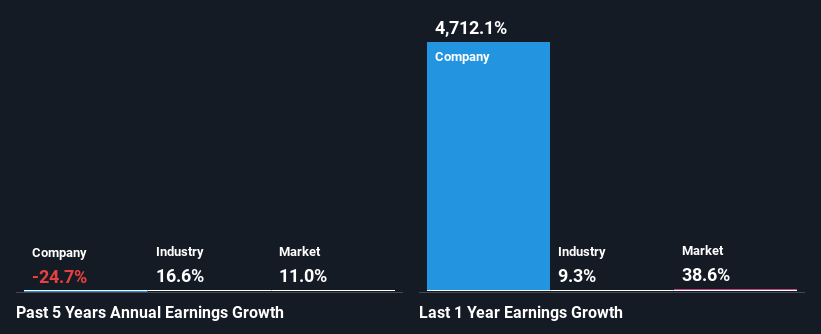McMillan Shakespeare Limited's (ASX:MMS) Stock is Soaring But Financials Seem Inconsistent: Will The Uptrend Continue?
McMillan Shakespeare (ASX:MMS) has had a great run on the share market with its stock up by a significant 5.9% over the last week. However, we wonder if the company's inconsistent financials would have any adverse impact on the current share price momentum. Specifically, we decided to study McMillan Shakespeare's ROE in this article.
Return on equity or ROE is a key measure used to assess how efficiently a company's management is utilizing the company's capital. Put another way, it reveals the company's success at turning shareholder investments into profits.
See our latest analysis for McMillan Shakespeare
How To Calculate Return On Equity?
Return on equity can be calculated by using the formula:
Return on Equity = Net Profit (from continuing operations) ÷ Shareholders' Equity
So, based on the above formula, the ROE for McMillan Shakespeare is:
23% = AU$61m ÷ AU$269m (Based on the trailing twelve months to June 2021).
The 'return' refers to a company's earnings over the last year. That means that for every A$1 worth of shareholders' equity, the company generated A$0.23 in profit.
What Is The Relationship Between ROE And Earnings Growth?
We have already established that ROE serves as an efficient profit-generating gauge for a company's future earnings. Based on how much of its profits the company chooses to reinvest or "retain", we are then able to evaluate a company's future ability to generate profits. Assuming everything else remains unchanged, the higher the ROE and profit retention, the higher the growth rate of a company compared to companies that don't necessarily bear these characteristics.
McMillan Shakespeare's Earnings Growth And 23% ROE
First thing first, we like that McMillan Shakespeare has an impressive ROE. Additionally, a comparison with the average industry ROE of 21% also portrays the company's ROE in a good light. As you might expect, the 25% net income decline reported by McMillan Shakespeare is a bit of a surprise. So, there might be some other aspects that could explain this. For example, it could be that the company has a high payout ratio or the business has allocated capital poorly, for instance.
So, as a next step, we compared McMillan Shakespeare's performance against the industry and were disappointed to discover that while the company has been shrinking its earnings, the industry has been growing its earnings at a rate of 17% in the same period.
Earnings growth is a huge factor in stock valuation. What investors need to determine next is if the expected earnings growth, or the lack of it, is already built into the share price. By doing so, they will have an idea if the stock is headed into clear blue waters or if swampy waters await. Is McMillan Shakespeare fairly valued compared to other companies? These 3 valuation measures might help you decide.
Is McMillan Shakespeare Using Its Retained Earnings Effectively?
With a three-year median payout ratio as high as 108%,McMillan Shakespeare's shrinking earnings don't come as a surprise as the company is paying a dividend which is beyond its means. Paying a dividend beyond their means is usually not viable over the long term. To know the 3 risks we have identified for McMillan Shakespeare visit our risks dashboard for free.
Moreover, McMillan Shakespeare has been paying dividends for at least ten years or more suggesting that management must have perceived that the shareholders prefer dividends over earnings growth. Our latest analyst data shows that the future payout ratio of the company is expected to drop to 57% over the next three years. The fact that the company's ROE is expected to rise to 28% over the same period is explained by the drop in the payout ratio.
Summary
In total, we're a bit ambivalent about McMillan Shakespeare's performance. Despite the high ROE, the company has a disappointing earnings growth number, due to its poor rate of reinvestment into its business. That being so, the latest industry analyst forecasts show that the analysts are expecting to see a huge improvement in the company's earnings growth rate. Are these analysts expectations based on the broad expectations for the industry, or on the company's fundamentals? Click here to be taken to our analyst's forecasts page for the company.
This article by Simply Wall St is general in nature. We provide commentary based on historical data and analyst forecasts only using an unbiased methodology and our articles are not intended to be financial advice. It does not constitute a recommendation to buy or sell any stock, and does not take account of your objectives, or your financial situation. We aim to bring you long-term focused analysis driven by fundamental data. Note that our analysis may not factor in the latest price-sensitive company announcements or qualitative material. Simply Wall St has no position in any stocks mentioned.
Have feedback on this article? Concerned about the content? Get in touch with us directly. Alternatively, email editorial-team (at) simplywallst.com.

 Yahoo Movies
Yahoo Movies 
